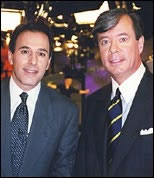Plastic & Reconstructive Surgeon NYC
The Today Show
Topic: Forever Young: "A Guide to Life After 50, Defensive Aging"


This morning on our continuing series FOREVER YOUNG: "A Guide to Life After 50, Defensive Aging." A study on identical twins recently published in the Annals of Plastic Surgery showed that lifestyle choices and environment can play a role in the rate at which we age, and even slow the aging process. Leading New York City plastic surgeon Dr. Darrick E. Antell is the author of the study. Doctor, good to see you.
Dr. DARRICK ANTELL (Plastic Surgeon): Thank you.
MATT LAUER: Let's talk about the premise her, and it sounds pretty obvious. If we're talking about identical twins, then we're talking about people with identical genes, and therefore....
Dr. ANTELL: Therefore they should age exactly the same because they're genetically alike. But I believe that people have highly overrated the influence of genes on the aging process. And a really important part of this study is that it proves that lifestyle choices very much affect the rate at which you age.
MATT LAUER: So this is really the nature vs. nurture debate, and you're saying the way we nurture ourselves in terms of our lifestyle has the greatest impact?
Dr. ANTELL: Exactly.
MATT LAUER: Where did you find your twins for the study?
Dr. ANTELL: We went to Twinsburg. Twinsburg, Ohio, has a large festival every year where thousands of twins come, and we took hundreds of photographs at that festival.
MATT LAUER: So now, what are the factors you looked at in terms of lifestyle that would impact the way we age? And I think you're talking more about the physical signs of aging, as opposed to how we feel?
Dr. ANTELL: Yes, the physical signs. And the most important factors appear to be sun exposure, smoking, stress, and other contributing factors would be healthy lifestyle choices like exercise, eating well, medical problems, stuff like that.
MATT LAUER: Well, let's take a look at some of the pictures we have on the set. We want to tell people at home, these are not before and after pictures.
Dr. ANTELL: Correct.
MATT LAUER: And this one talks about the effects of the sun. Tell me what we have here.
Dr. ANTELL: The twin on the left led a very carefree lifestyle. She was out in the sun all the time, lived in Southeast Asia, and then California. If you look at her skin, it's just coarser, there are many more wrinkles, they are deeper. There are wrinkles around the eye, there's discoloration of her skin. And Matt, there are even sunspots on her nose. There's loose skin around her neck. Compared to her sister, who looks much better. Now they're exactly the same age, and she has some wrinkles, but they're just not as deep, and the skin is better quality.
MATT LAUER: In terms of their lifestyle, though, was everything else the same?
Dr. ANTELL: Everything else was pretty much the same, although....
MATT LAUER: Stress and smoking things like that?
Dr. ANTELL: There are a couple of minor things, but we felt that sun exposure was really the main contributing factor here.
MATT LAUER: All right, let's back up a second here, because our next set of identical twins show us the effect of smoking and tell us what we have here.
Dr. ANTELL: Exactly. This set, they both lived in the same midwestern area, so we did not feel that smoking was the contributing factor. Rather, the twin on the left....
MATT LAUER: Not sun, you mean.
Dr. ANTELL: Correct, not sun. The twin on the left smoked for 30 years, whereas the twin on the right never smoked. So if you look at the lines on the forehead over here, and the vertical line here, lines around the eye and the loose skin along the neck is much different than on her twin sister, where it's much smoother.
MATT LAUER: And would that hold true, because from what I've read, smoking affects the elasticity in the skin.
Dr. ANTELL: Well, actually, the smoking shrinks all the capillaries, the little blood vessels that feed the skin, so it's not getting proper nourishment. The same thing happens with stress.
MATT LAUER: All right, let's take a look at stress right here. Again, not a before and after picture, we have identical twins here. Tell me what we should look for.
Dr. ANTELL: Now we've heard of people that, quote, "went gray overnight" with a stressful event, because it clamps down all the blood vessels. And some other subtle changes that you see are the lines in the forehead, lines between the eyebrows, lines on the cheek, and an overall change in the quality of aging, compared to her sister, her twin sister.
MATT LAUER: Now are you talking about an overall stress, the lifestyle, or someone who may have had a stressful event?
Dr. ANTELL: They both had children, they both lived in the same midwestern environment, but the twin on the left had gone through a difficult divorce, and then we thought that was a contributing stressful factor in her life.
MATT LAUER: You also went out and then you conducted face-lifts on twins. What did you find there?
Dr. ANTELL: Well, interestingly, we've at this point done more facelifts than anyone else in the World on identical twins. We did different face-lifts on them. We're studying the face-lift operations, so that we could bring them back into balance, but so that we could also examine the different techniques of face-lift surgery. Now this is a before and after....
MATT LAUER: This is the same person here.
Dr. ANTELL: Correct. It's the same person, and if you look at the before, you see the loose skin that she has along the neck....
MATT LAUER: Back up a little further. There we go.
Dr. ANTELL: ...and along the jaw line, she has a jowl formed over her. And in the post-operative picture, you see how....
MATT LAUER: Right.
Dr. ANTELL: ...how much cleaner it is over here, how the jaw line is clean and the neck is much cleaner.
MATT LAUER: Based on your studies with these identical twins, you've come up with ways that we can be defensive in our lifestyle in terms of aging. And so, what are the obvious answers to that?
Dr. ANTELL: Well, it's all the things that mom always told you. You should avoid direct sunlight, you should avoid smoking. You should eat a good diet, get regular exercise, and if necessary, later on in life consider plastic surgery to re-balance things.
MATT LAUER: I would imagine when you showed these identical twins the difference in their faces, based on their level of exposure to the sun and smoking and stress, the one who didn't look as good probably came to you real quickly.
Dr. ANTELL: Well, they were - they were never really as aware of it, because they only see each other one at a time because they're twins. It's only us that sees them as twins.
MATT LAUER: Right, that sees them side by side.
Dr. ANTELL: So when we showed them the pictures, it was very revealing.
MATT LAUER: Dr. Darrick Antell, thanks very much. We appreciate it.
Dr. ANTELL: Thank you.


